Quick Demo Tour
You can find in the video below a quick tour of the Quasible application that demonstrate how to create a simple AI agent executing a basic workflow and making it accessible on the web.
General information
Purpose
The purpose of this document is to provide an initial assistance for getting started with the application.
Contact information
Any request for information and any notification of issues encountered with the application should be sent to the following address:
QDoc documentation agent
To ask any question on the latest version of the Quasible documentation you can go the public Quasible Documentation "Multilingual" Agent accessible
HERE for the "slow but accurate" advanced reasoning QDoc agent
HERE for the "fast and furious" simpler QDoc agent
General Features
Sign Up
Process
- connect to quasible.ai
- click on "Start for Free" or "Sign Up"
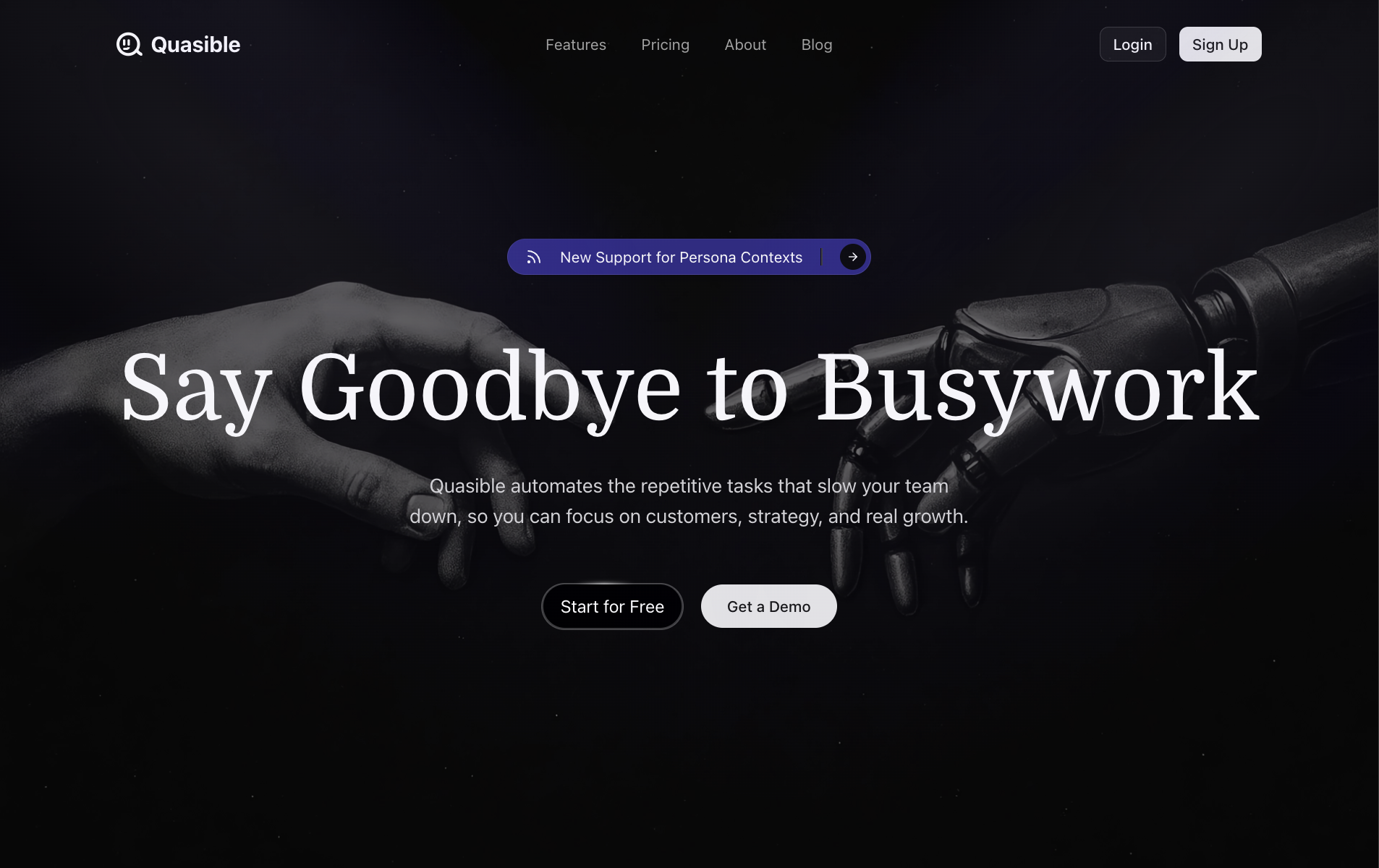
- Fill the form for account creation or "Sign up with Google"
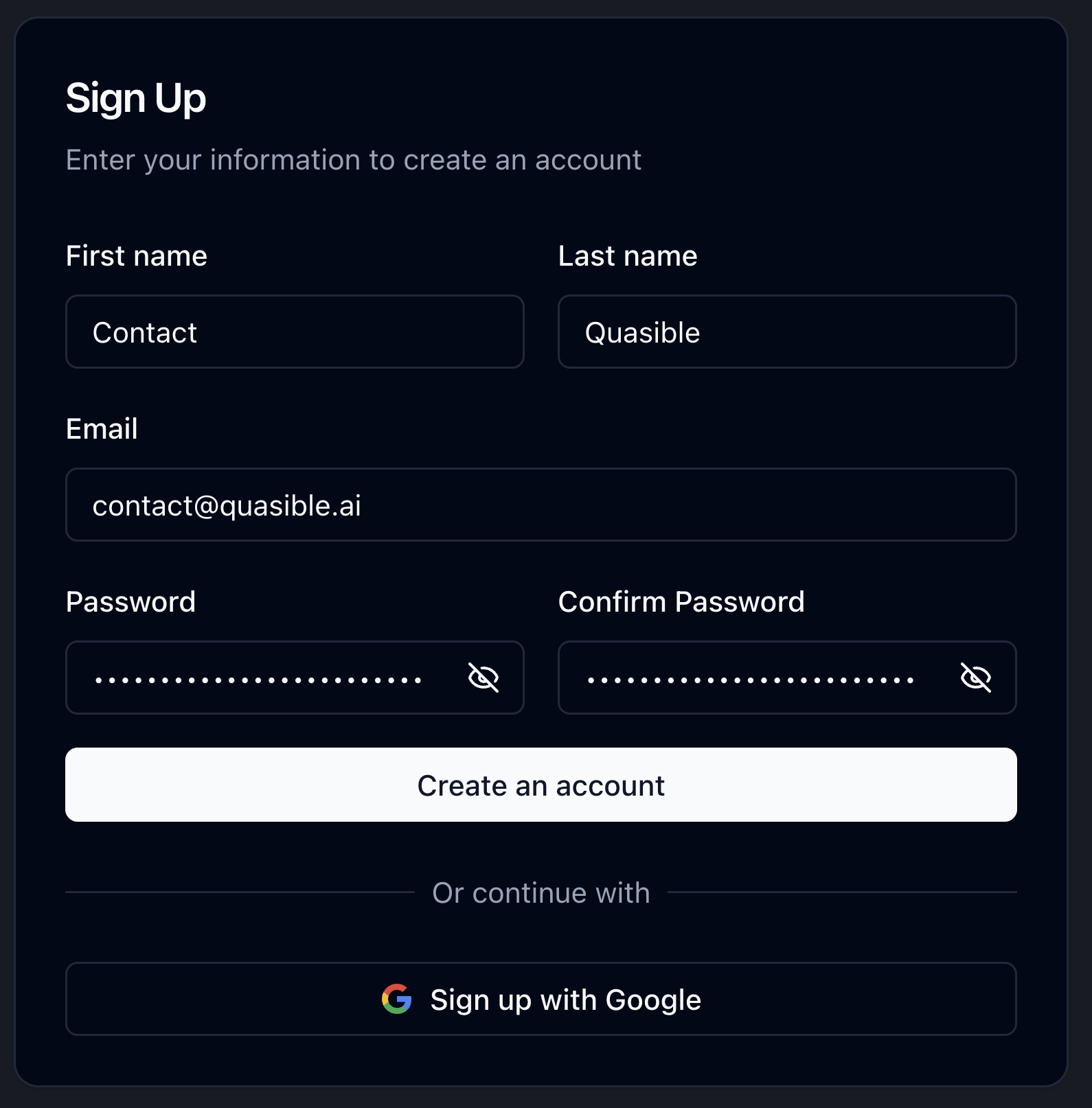
- Once connected you get the Quasible.ai Dashboard
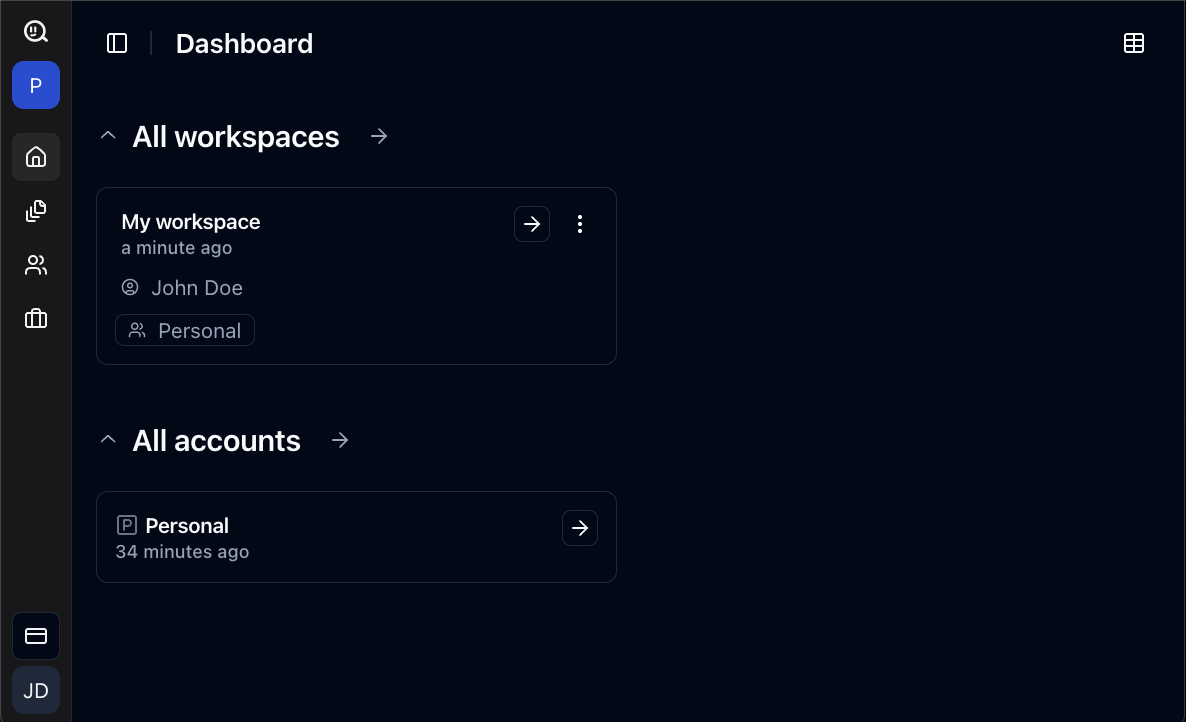
Go to the main Dashboard
Rational
At any point in time you may want to retrieve the main Dashboard to access documents, workspaces, accounts, ...
Process


Organisation / Account Management
Access to your organisation settings
A Personal organisation account is created for each new member that Signs Up.
Remark: Each new account starts with a Free tiers which gives a pack of 1000 credits to explore basic features of Quasible.
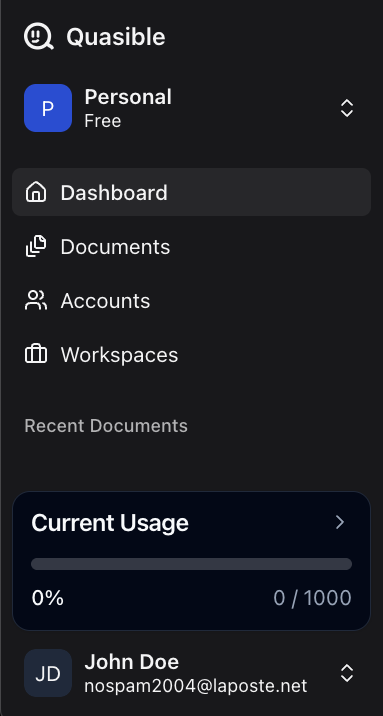
Access to Personal Organization settings
Process
- Click on your Personal Organisation icon

- Select Settings

- Consult the General section of your settings
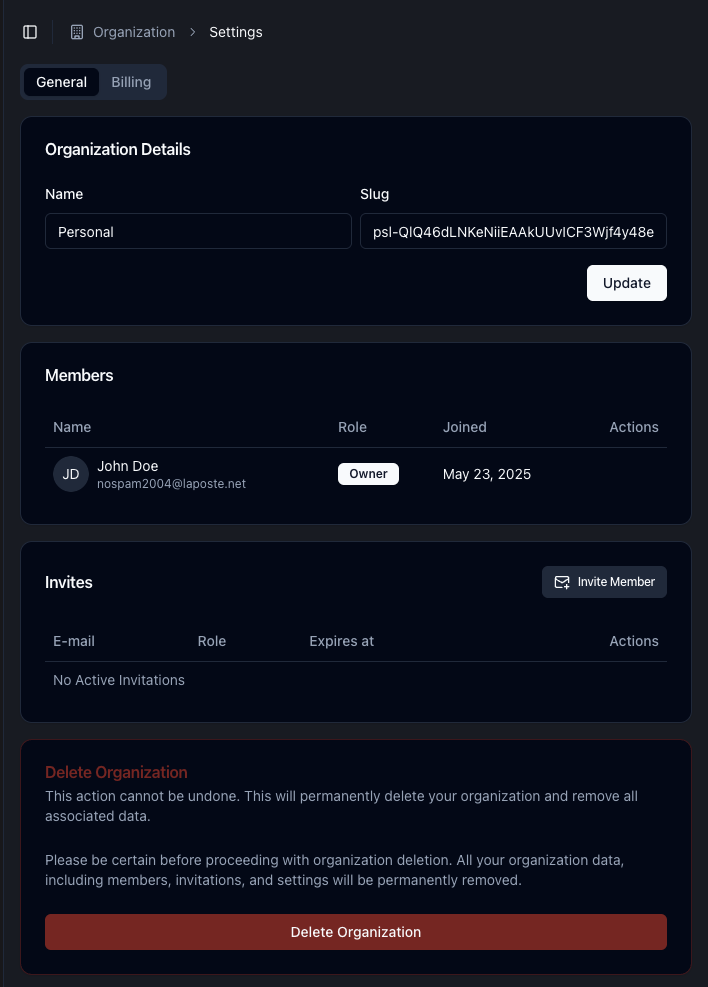
- Consult the Billing section of your settings

- DONE
Features accessible in the Organisation Settings
General sections
- Edition of Organisation Details
- Invite members to the organisation
- Delete Organisation
Billing section
- Consult Credits Usage
- Upgrade Plan
Productivity features
Rational
Quasible possesses several features that have been designed to increase productivity.
Switch between cards or list view
At several locations you might see these icons. By clicking on them you'll switch between the cards and the list views of elements


Cards view
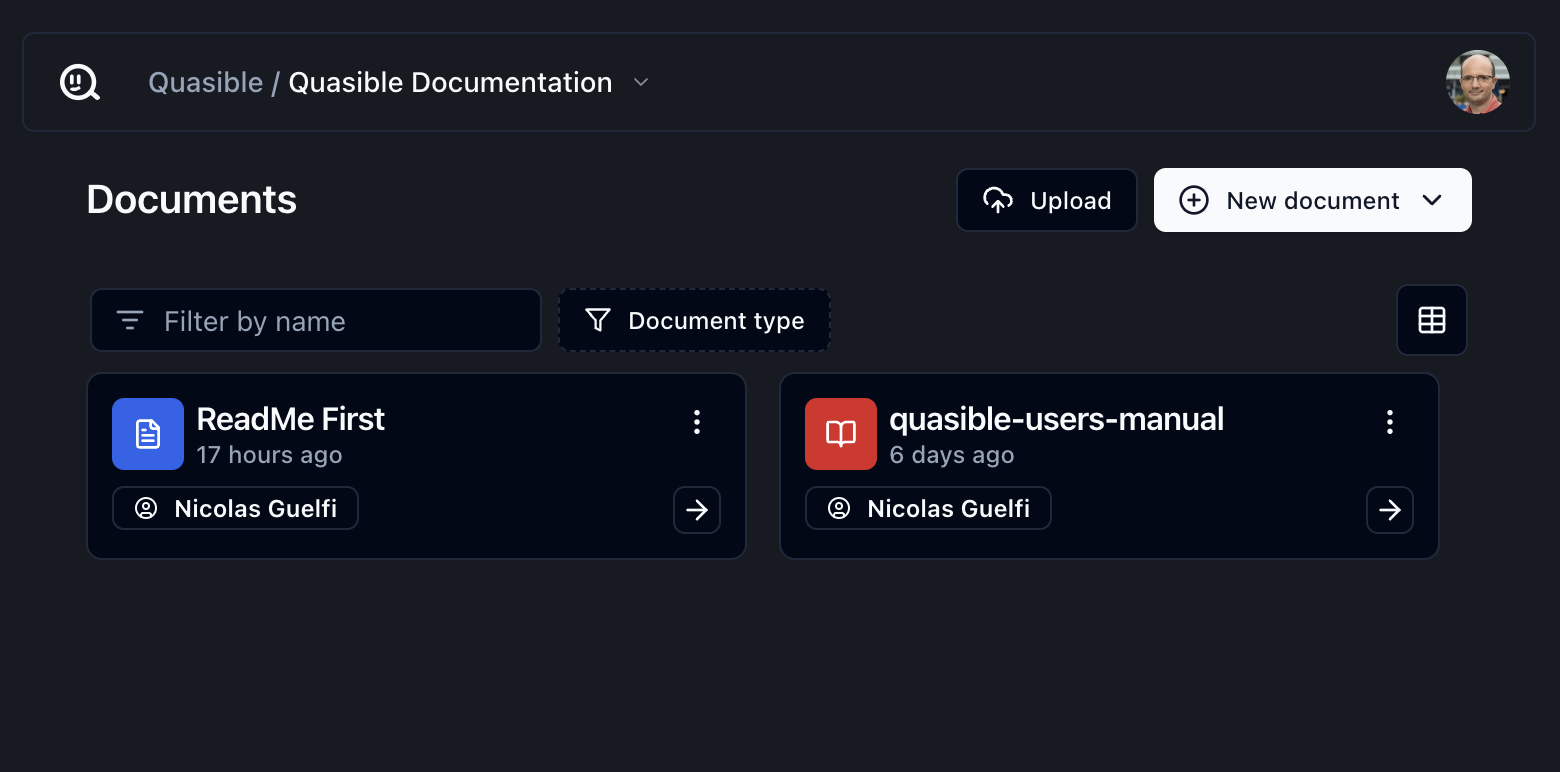
List view

Filtering documents
When you are in a view in which documents (Text documents, chats, pdf, personas, ...) are displayed you might be able to filter those elements.
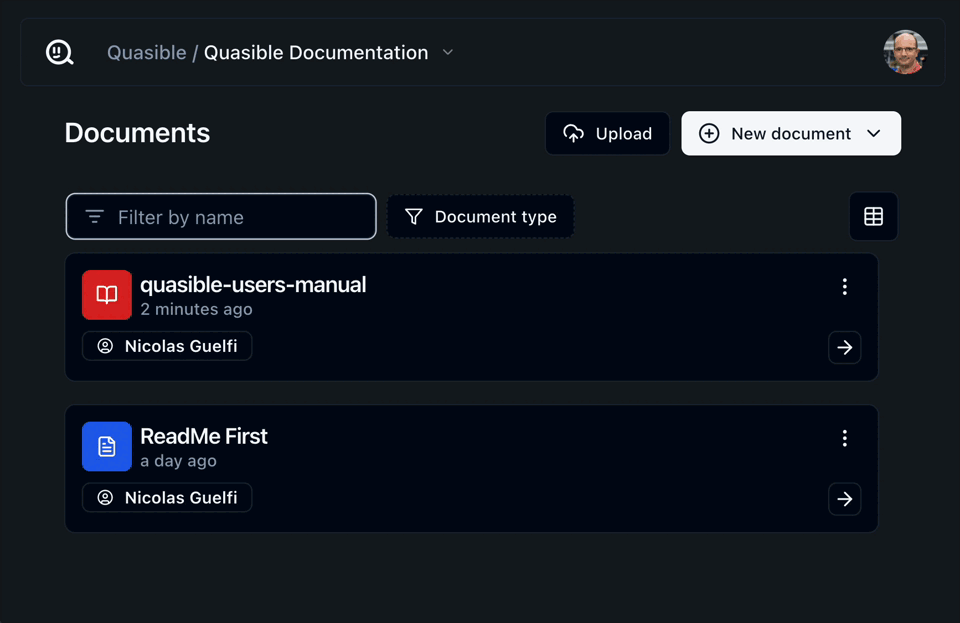
Accounts and Workspaces
Rational
Workspaces are used to organise your work and group your documents.
An Account is used to define a zone for a team of collaborators that contains workspaces accessible to your collaborators.
- An account can contain many workspaces.
- A workspace can contain many documents.
Creating a workspace
Rational
Any document is contained in a workspace. Thus apply this process if you do not already have one or need a new one
Process
- Go to your dashboard and click on the targeted account arrow

- Click on New Workspace

- Provide a name and click on Create

Chat features
Start a Chat
Rational
With Quasible.ai there are many locations where you can chat. We illustrate below a default simple process to allow us to quickly chat with our chatbots.
Process
-
Go to an existing workspace

-
Click on New Document button

- Select "Chat"
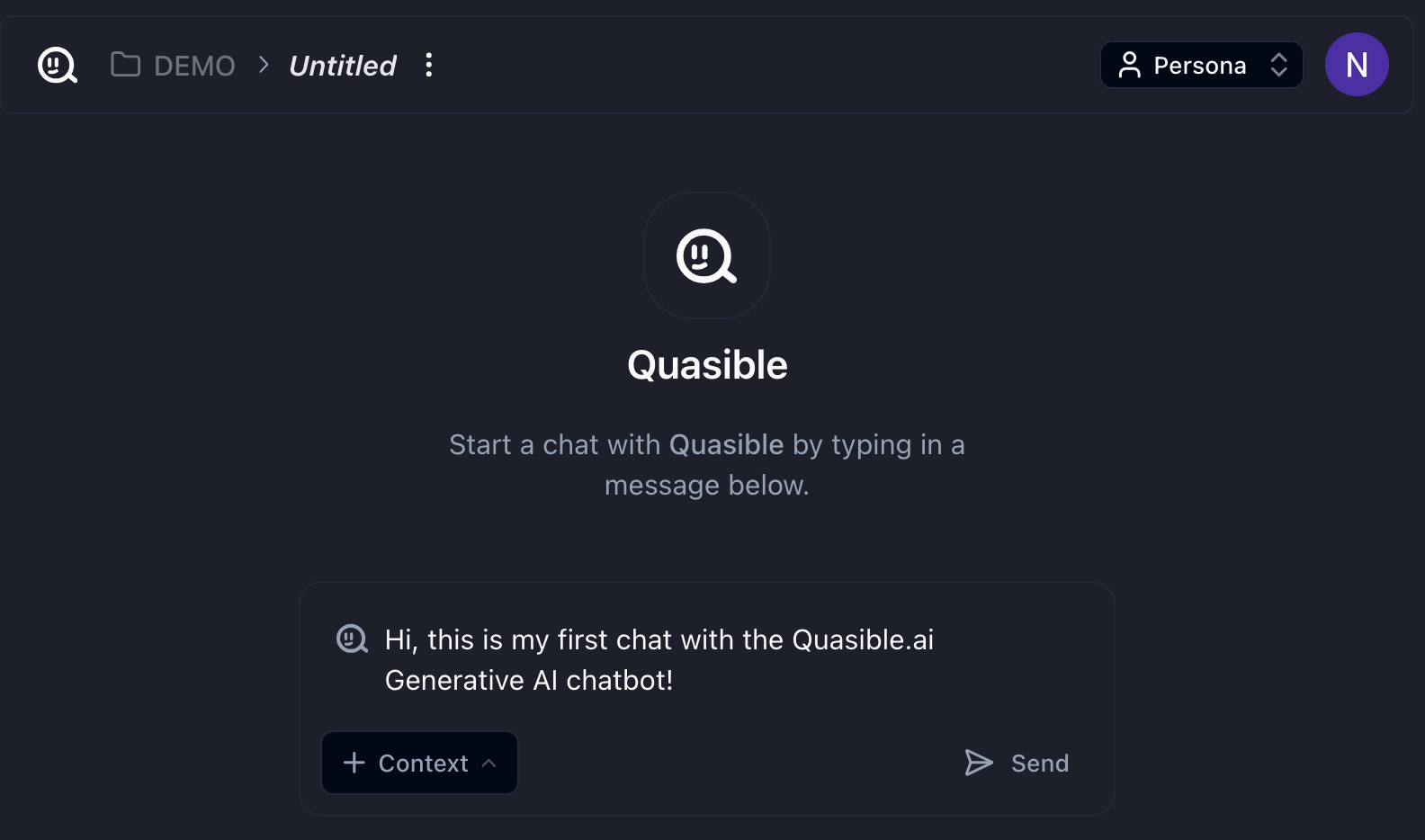
- Set a smart name for the Chat document

- Chat with Quasible.ai

Access Chat history
Rational
When you chat with a document several times or if you reopen a document on which you had some chats, you may need to reconsult the previous chats.
Process
- Open your document
- Click on the pane icon
 of the chat section
of the chat section


Draw with Quasible
Rational
During a chat you may want to ask Quasible to draw an image to reuse it later on.
Process
Ensure to be in a Quasible Chat
Ensure that your question clearly asks to draw something

Download or insert your image in the opened text document if any
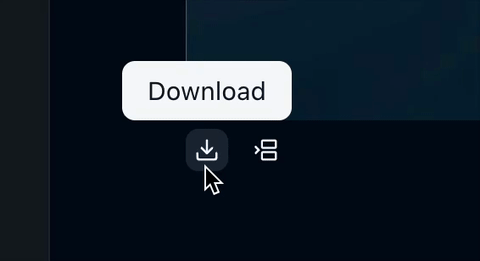
Documents features
WARNING: Each imported document is analyzed automatically. It takes time and consumes credits. So ensure that you manage your credits in a way that suits you.
Rational
You can upload documents to your workspace to ensure they are considered when interacting with Quasible. The uploaded documents will be analyzed and remain accessible at all times, allowing you to select them as part of the context for your conversations (see Section: Context).
Create a New Document
Rational
You can create documents of the following types:
- Text documents
- Template
- Chat
- Persona
Process
- Access to a workspace
- Click on the button "New Document"

- Select the document type you wish
Get a PDF Document Summaries
Rational
For each imported PDF, two summaries are generated. The first is a short summary, and the second is a detailed summary. You can select these summaries or export them to documents based on your needs.
Process
- Click on the menu kebab icon


-
or in view viewing a document

-
Select the type (long or short) of your summary
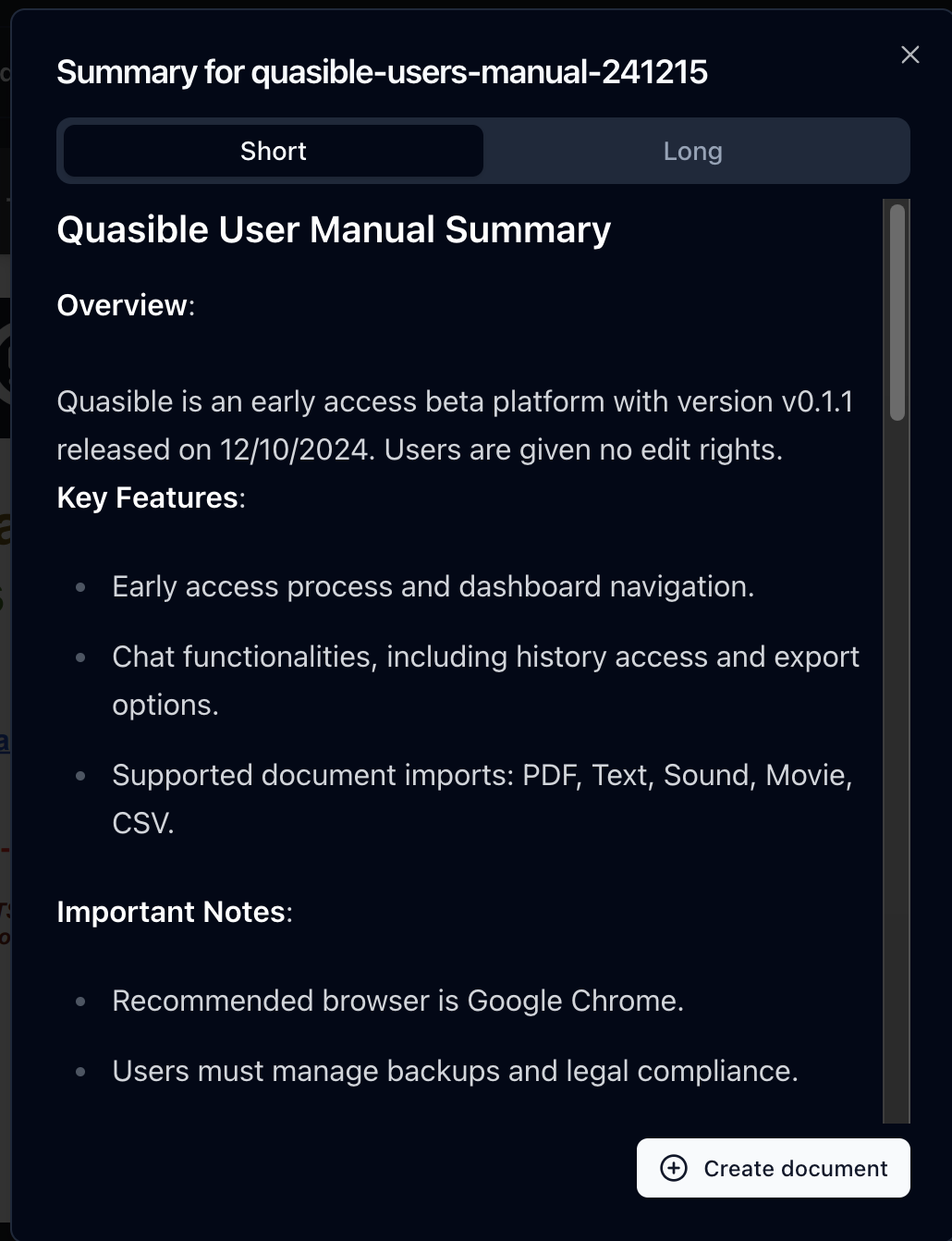
-
(optional) click on "Create document" to create a quasible text document from your selected summary.
Export a document
Access for any quasible document type
Either on the options selector of a document card or in an opened document
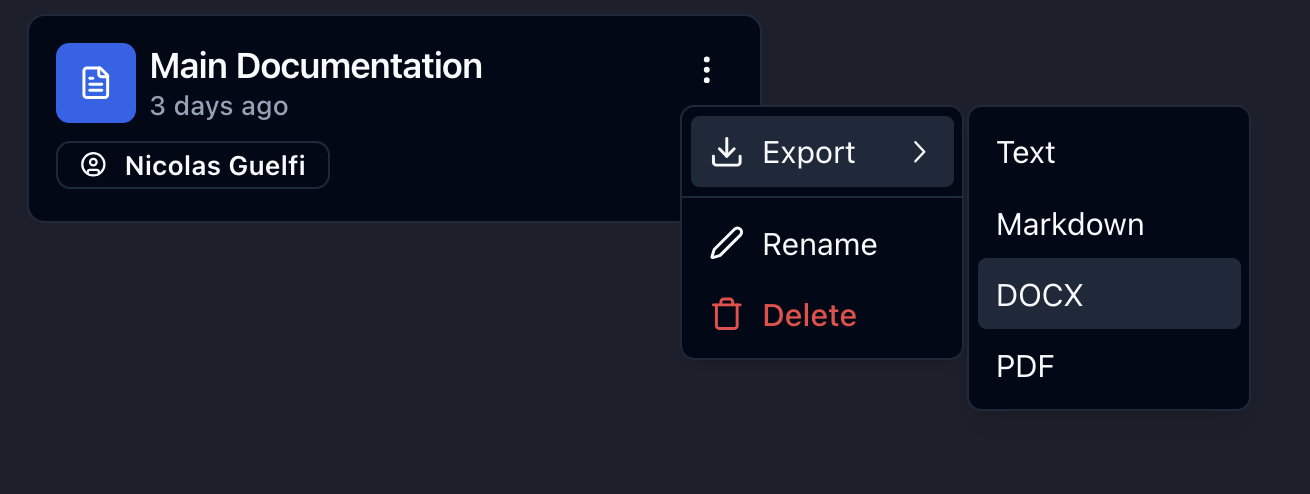

Access for chats in a document
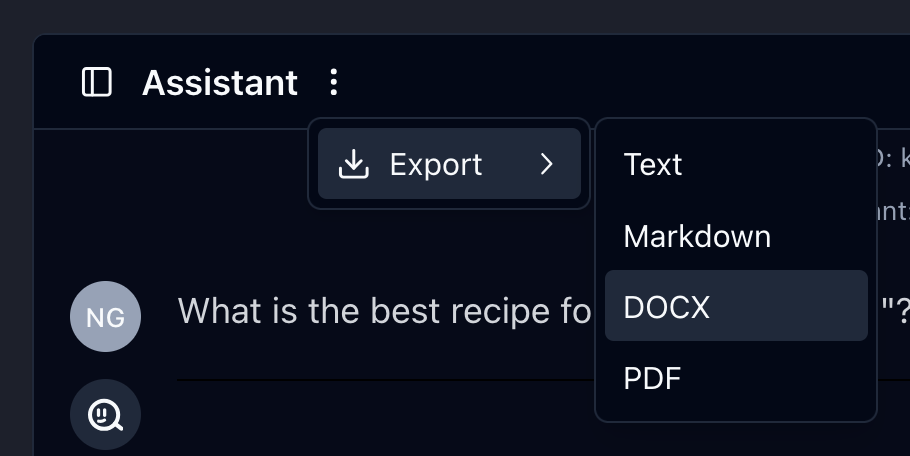
Export to DOCX
Document of any type
You can find below a screenshot of the Quasible tool showing the feature:

Chats inside a document
You can find below a screenshot of the Quasible tool showing the feature:


Upload/Import a document
Rational
You can upload / import any document of the types indicated above in order to use them inside Quasible.
Upload Document types
Text
Sound
Accepted formats: mp3, wav, ogg
Movie
Accepted formats: mp4
CSV
URL
Only for websites that either you own or that explicitly allows to be scrapped by robot tools.
Markdown
Not yet available.
Limitation
You cannot import other types of document including:
- DOCX
- XLS
In order to import those documents in Quasible, you first need to them in a supported format (PDF, TEXT,..).
Process
- Access to a workspace
- Click on the upload button

- select "File" or "Link"

Contexts
Contexts are used to set the list of documents that should be considered when answering a chat question.


Personas
Rational
A Persona is equivalent to an expert of a specific task. You can create a Persona definition when you think that the expertise you describe in the persona could be reused in various chats you will have with Quasible.
If you have defined various personas, you then are able to activate or deactivate them when you are in a chat.
You can use several personas to answer a single question.
You have the possibility to indicate if the personas you select should work together merged on your task or sequentially one after each other.
You should view this as a team of assistants each one having its own expertise and it is you who decide when you use them and in which order they should apply their expertise.
Create a Persona
Rational
Personas define specific expertise for an AI ChatBot. In order to organize and manage all your expertise needs you can define as many personas as specific expertise fields you need in order to use them later on in various chats you will have with Quasible.
Process
- Go to an existing workspace (cf. documentation)
- Select "Persona" when clicking on "New Document'

- Name and create your persona

Warning(s)
- Do not use names longer than 16 characters to handle them easily
Workflows
Rational
You can decide in which way the Personas are collaborating. Either merged, in sequence one after the other or, in sequence of merged personas!
For each Persona involved in a workflow you can choose the Large Language Model that is used to answer the question (from Openai, Google, Microsoft, Mistral, Anthropic, Meta, ...).
Writing a good Persona and a good workflow is not an easy task and you are encouraged to follow some training on Prompt Engineering, Persona and workflows definition if you want to improve your generative AI experience.
In this section some very basic personas and workflows are provided to you such that you can test them in any order and change them to see their impact in Quasbile chats.

Figure: Example of a Workflow configuration for the Quasible Document
Personas
Concisor
You are an expert in concise writing.
You have to find the shortest way to communicate without losing important information
Hieratis
You are an expert in structured writing.
You ensure that the structure of the text you write is structured as much as possible using a hierarchical decomposition.
The hierarchical decomposition should reflect as much as possible a refinement. If you have a paragraph on a subject A that you decompose in two sub-paragraph A1 and A2 then it should mean that A1 and A2 are two more detailed aspects of subject A.
As an example, if you write a text on human intelligence then you could decompose it using the following Hierarchy:
- Human Intelligence
- Rational Intelligence
- Emotional Intelligence
Neutrinum
You write text in a neutral form.
You prefer using the it form instead of "I", "He", "She", "We" ...
Illustrix
You are an expert in writing illustrative introductory paragraphs.
When generating your text you ensure that it starts with an illustrative allegory that represents the main abstract ideas that is addressed in the following through a concrete image, story, or symbolic scene.
The goal is to help make complex concepts more understandable by translating them into an imaginative or narrative form, often rooted in a familiar context for the reader.
The allegory is only used in the first paragraph of the text you generate.
Positos
You are an expert in writing ending paragraphs that are positive and encouraging.
If the text you are provided with is a letter you use standard letter ending formulas.
If the text you are provided is a general text you ensure that the ending is open-ended showing the various and interesting perspectives on the subject previously addressed.
You do not change the remaining text except the last paragraph.
Examples of Workflows
In the following examples we present several workflows configurations for using some personas designed to be used in sequence or merged.
All these examples are here to demonstrate the impact of personas definition and workflows on chat results.
The Question: What is called 'healthy food'?"
This is the unique question we use to build all our examples in this section.
Workflow with "No Workflow"
Name:: Default
Configuration
As you can see below if there is this  in the
workflow selection dropdown it means that no workflow is selected and
then the question will be sent to Quasible default assistant.
in the
workflow selection dropdown it means that no workflow is selected and
then the question will be sent to Quasible default assistant.
In this case Quasible is answering itself the question as a general knowledge expert.
Execution(s)

Image of the workflow execution
Workflow with Merged: Consisor + Hieratis
Name:: WF_Co+Hi
Configuration

Execution(s)
Workflow with Sequence: Neutrinum → Illustrix → Positos
Name:: WF_Ne → Il → Po
Configuration

Execution(s)

Image of the workflow execution
Variants
In this section we create workflow configurations specifically designed for the personas we designed.
Concisor → Hieratis
Name:: WF_Co → Hi
Configuration
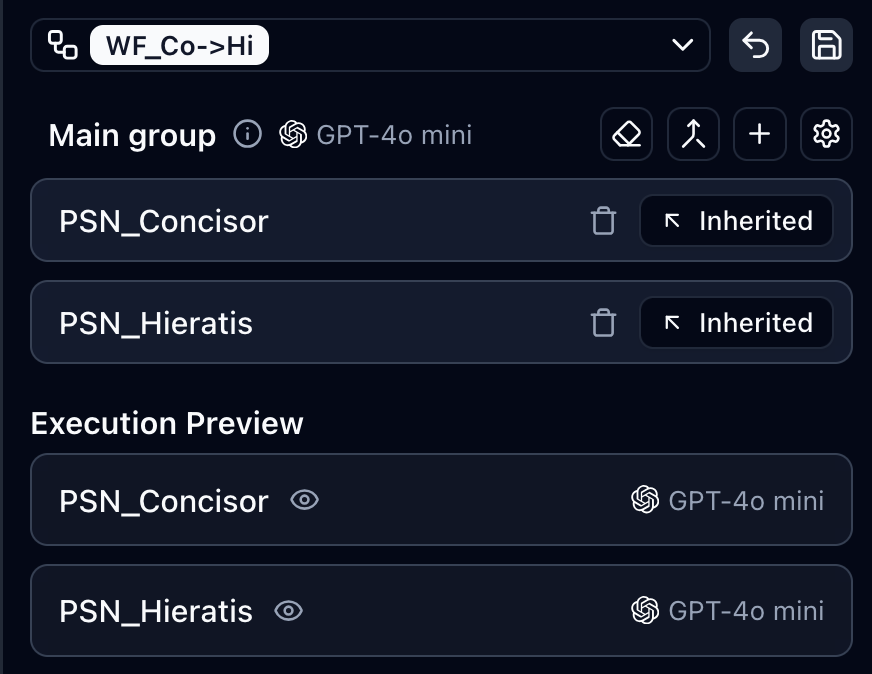
Execution(s)

Image of the workflow execution
Neutrinum + Illustrix + Positos
Name:: WF_Ne + Il + Po
Configuration

Execution(s)
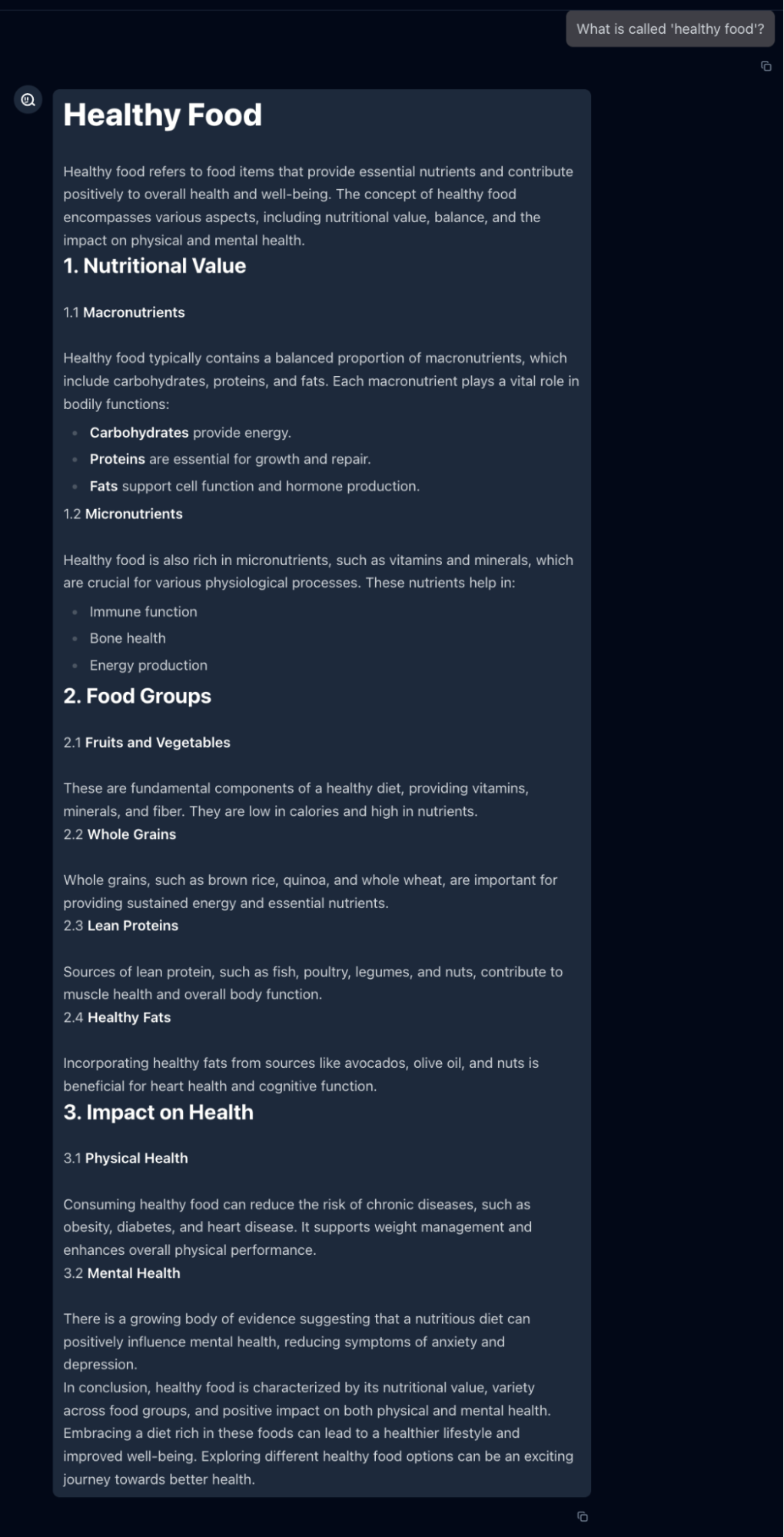
Image of the workflow execution
Neutrinum+Illustrix+Positos+Concisor+Hieratis
Name:: WF_Ne → Il → Po
Configuration
Execution(s)
Just showing the last Persona result

Image of the workflow execution
Neutrinum → Illustrix → Positos → Concisor → Hieratis
Name:: WF_Ne → Il → Po → Co → Hi
Configuration

Execution(s)
Just showing the last Persona result

Image of the workflow execution
Use a Workflow in a chat
Rational
Your created personas can be used in your chats with Quasible in order to have a Quasible chatbot that applies the specific expertise defined in your persona.
Process
-
Create a chat document (cf. documentation)
-
Select "Chat" when clicking on "New Document' and name it

-
Select the personas you want to be applied for this chat
-
Click on Personas button and then on your Persona name you want to select
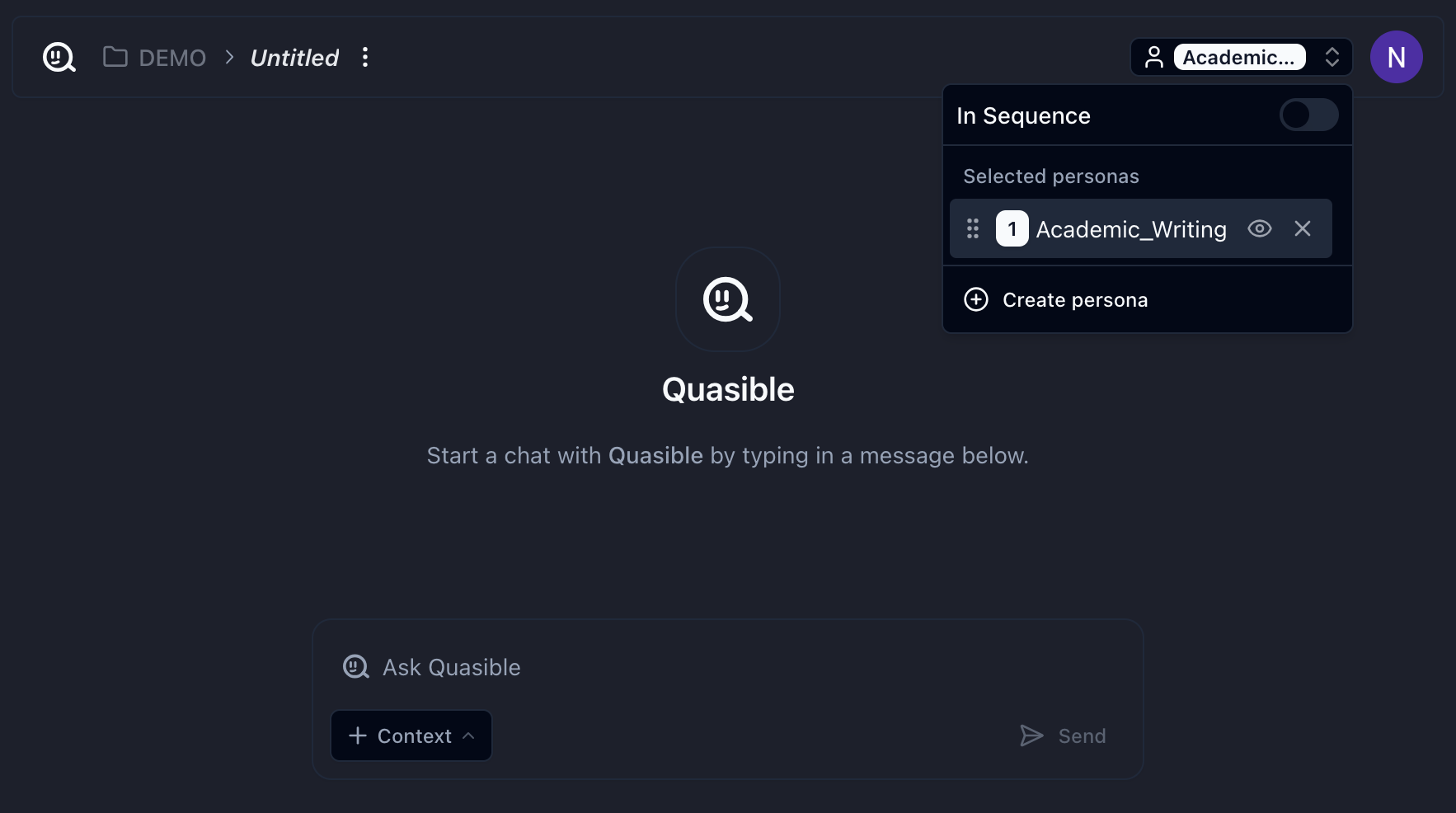
-
Verify that your persona is selected by looking if it is numbered and added to the top of the list
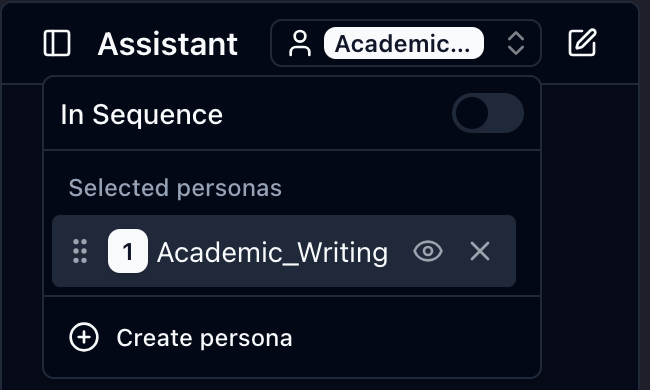
-
Ask a question in the chat pane
Workflow Groups
Rational
You can create workflow groups that are executed in Sequence
Let us create the following workflow named "WF_(Po+Hi)->Co"
-
Step 1
- The two personas PSN_Positos and PSN_Hieratis are used together both using the Openai model GPT-4o mini inherited from the Group model
-
Step 2
- PSN_Concisor persona is executed using a reasoning model from DeepSeek
Here is th final workflow configuration that we will reach at the end of the process:

Process
-
Click on the Workflow dropdown button
-
Select

-
Set the Name:

-
Click Create
-
your workflow is added to the list

-
Select your workflow

-
Click on the
 button in the "Main group"
line:
button in the "Main group"
line:
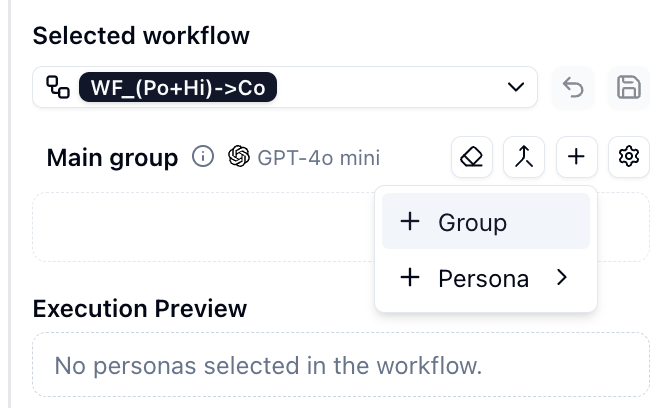
-
select "Group"

-
Click on the "+" in the "Main group" line

-
Select Persona and then Select "PSN_Positis"

-
Repeat this process to add "PSN_Hieratis" in Group 1:

-
Click on the Group wheel icon

-
Switch on "Merge personas" and click "Update"

-
Click on the "+" on the "Main group" line and click on "Group"
-
Click on the "+" on the "Group 2" line and click on "Persona" and select "PSN_Concisor"

-
Click on the
 button on the line of
"PSN_Concisor"
button on the line of
"PSN_Concisor" -
Select "DeepSeek R1"

-
WARNING - Click on save button

-
Selected your newly created workflow for the agent

-
Click on the Main group general settings wheel
-
Activate the set the "Show only last persona in deployed agent"

-
Click on the "General" tab of the Agent

-
Click on "Context" dropdown button and select the context document you want for your agent
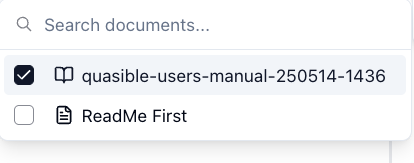
-
Test your Agent by asking a question on the left and check the behavior of your agent

Main Model Providers and versions
Rational
Chaque expert pour lequel vous définissez un profile à l'aide d'un document Persona est destiné à être exécuté par un grand modèle de langue, appelé modèle, et produit par un fournisseur de modèles.
Quasible vous permet de associer votre modèle à chaque persona lors de la configuration des workflows.
Vous trouvez dans cette section, un aperçu des modèles disponibles et de leur caractéristiques.
Model Providers
Below are the model providers accessible to you within the Quasible platform tool.
The list of available models changes frequently.
Each model has unique characteristics tailored for different tasks and carries specific costs. Experimenting with models is essential for optimal use.
Model Cost and Context length
Vous trouvez ces informations pour chaque modèle, lorsque vous le sélectionnez 👍
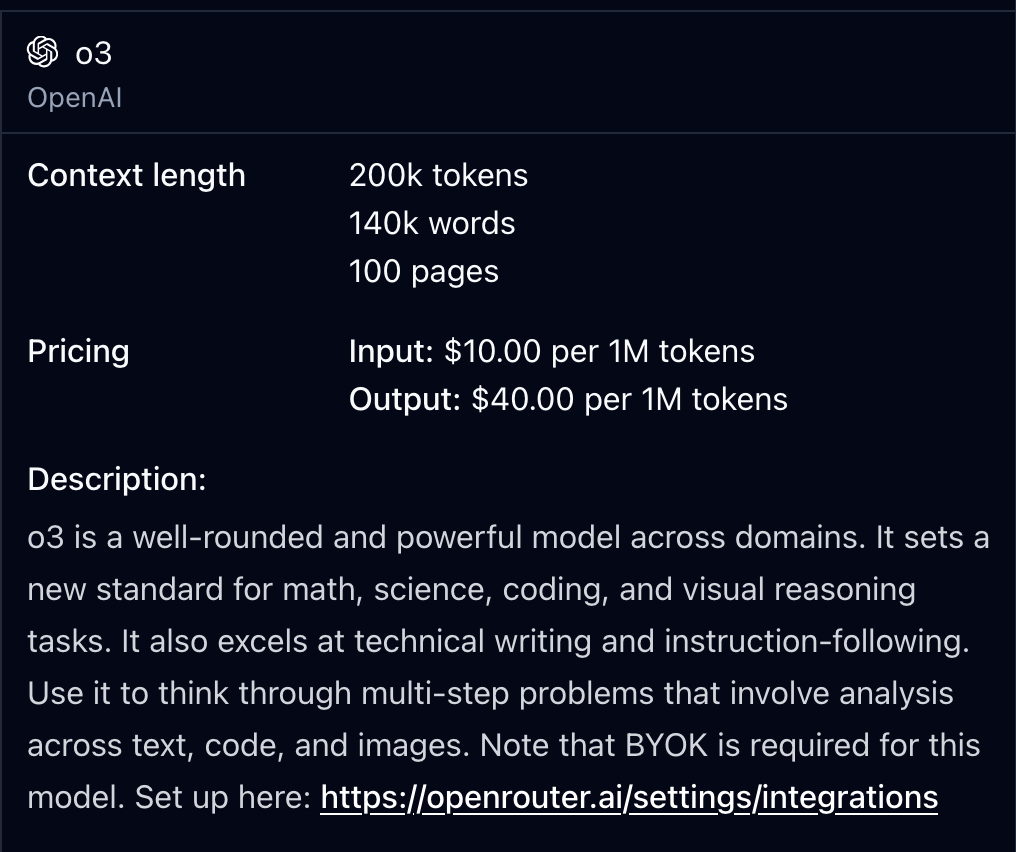
Openai

Anthropic

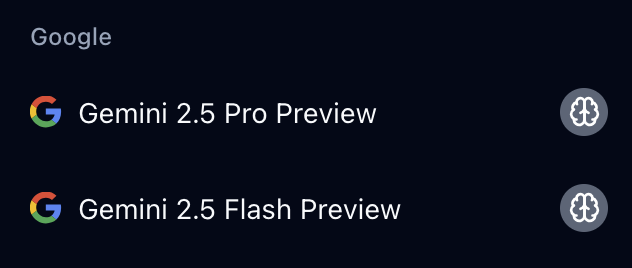
DeepSeek
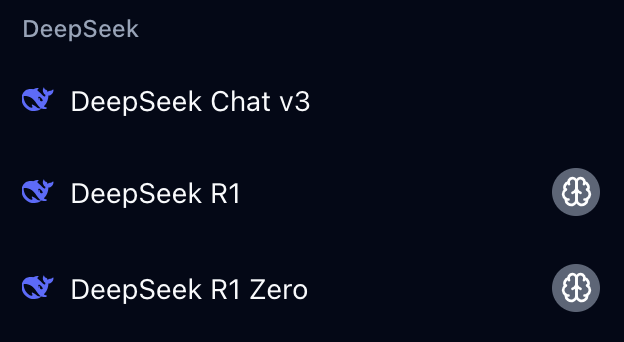
Meta

Microsoft

The Model selection page
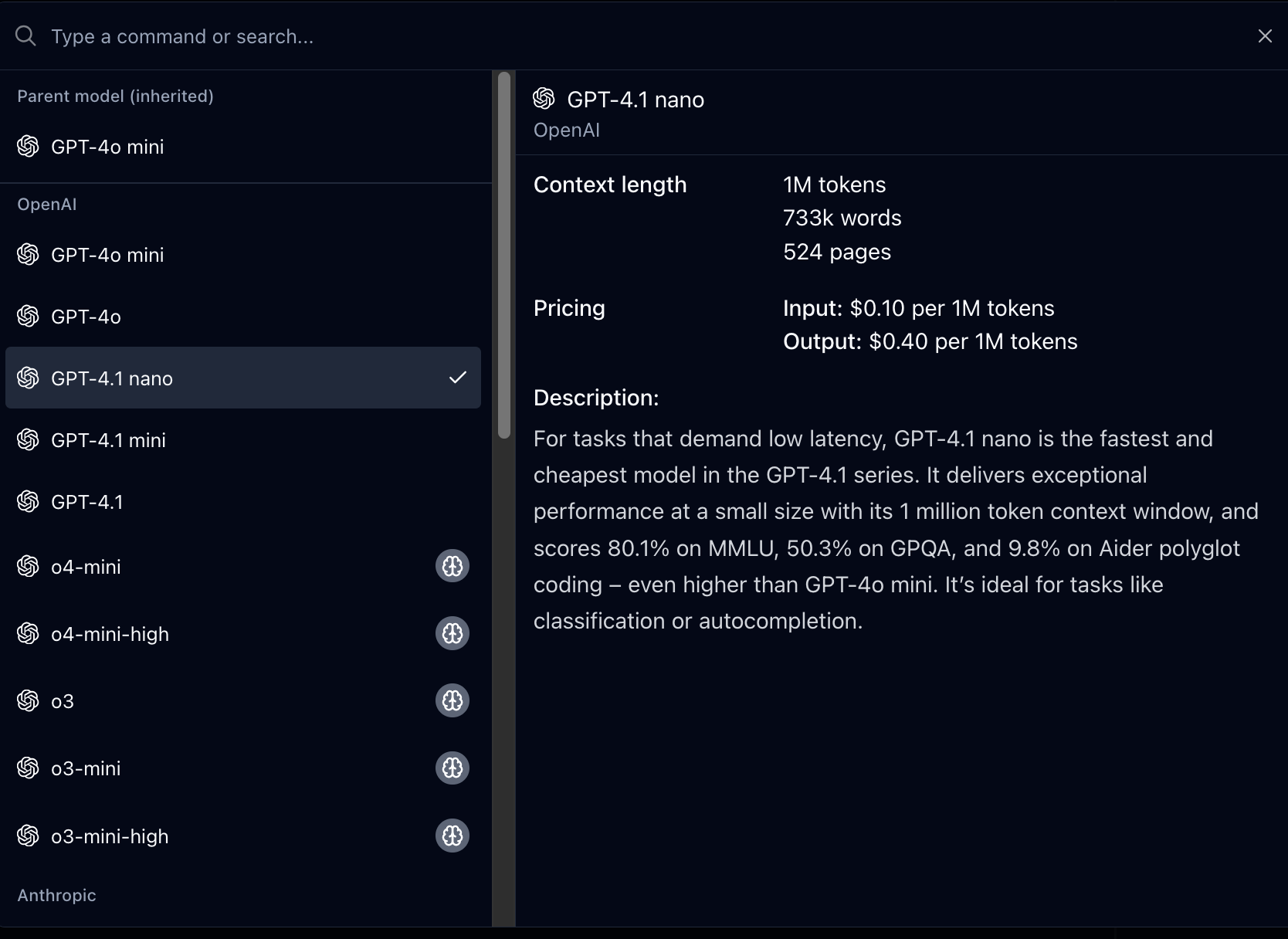
Agents
Rational
An agent in Quasible represents a generative artificial intelligence assistant that can be accessed locally within the Quasible application or publicly on the Internet, and that executes specific workflows.
For example, below is the interface of QDoc agent, which allows users to ask questions about this documentation and is available publicly or within the Quasible application.
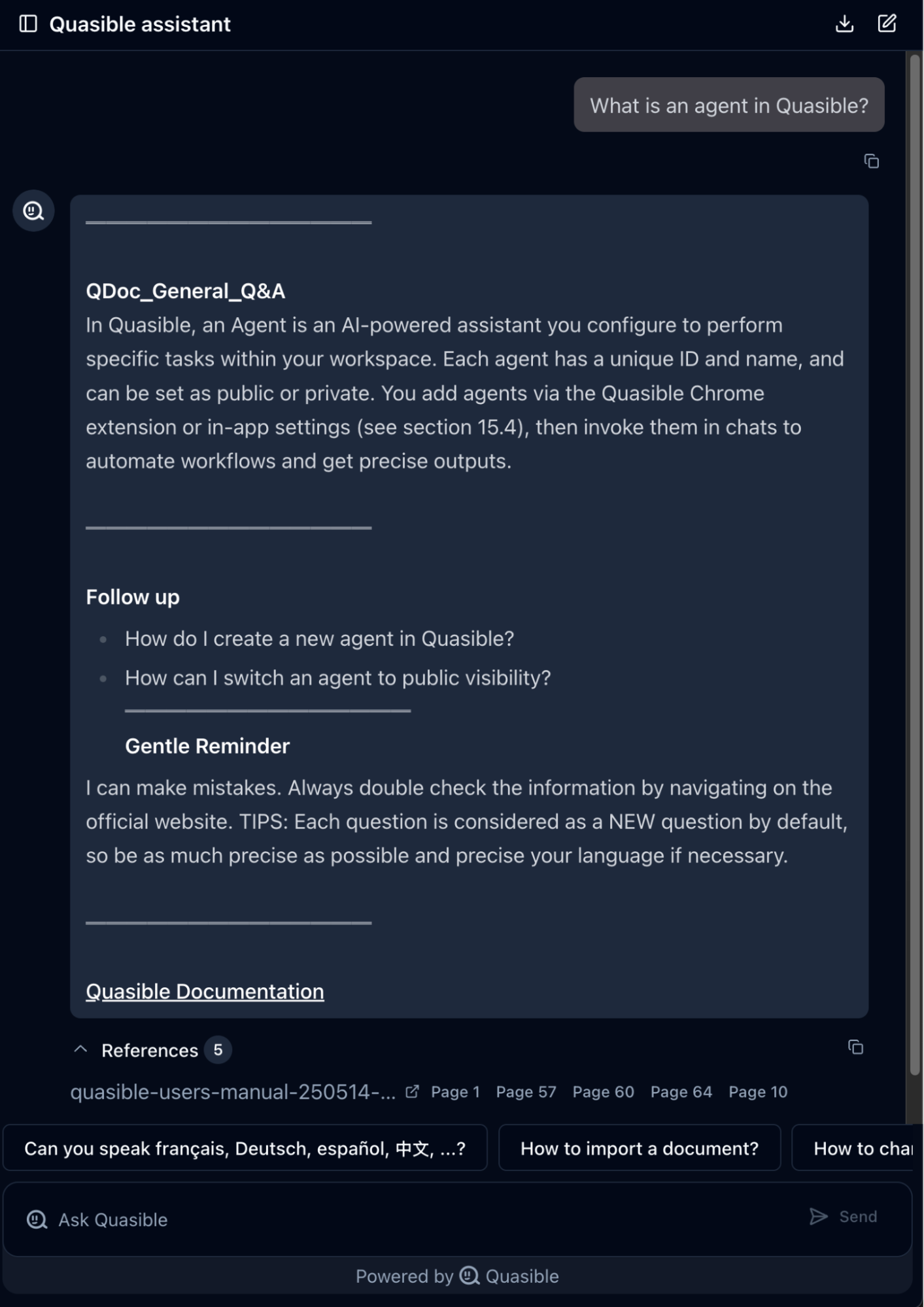
Screenshot of the QDoc Agent for this documentation
Create an agent
Rational
Create a new agent in your workspace.
Process
- Access to your workspace
- Click on New document"

- DONE!
Proceed to the Agent General Configuration
Rational
In the default main configuration screen, you can:
- Set public your agent
- Define if you want Thibault branding to be displayed on your agent
- Add suggested questions
- Define the knowledge base using your context for your agent
Process
- Use the Agent configuration main screen elements:

- DONE!
Get the Public link for an Agent
Rational
In the default main configuration screen, you can:
- Set public your agent
- Define if you want Thibault branding to be displayed on your agent
- Add suggested questions
- Define the knowledge base using your context for your agent
Process
- Click on
 in the main agent confirmation
screen
in the main agent confirmation
screen - copy the link:

- Open a new browser tab
- Test the link and the agent
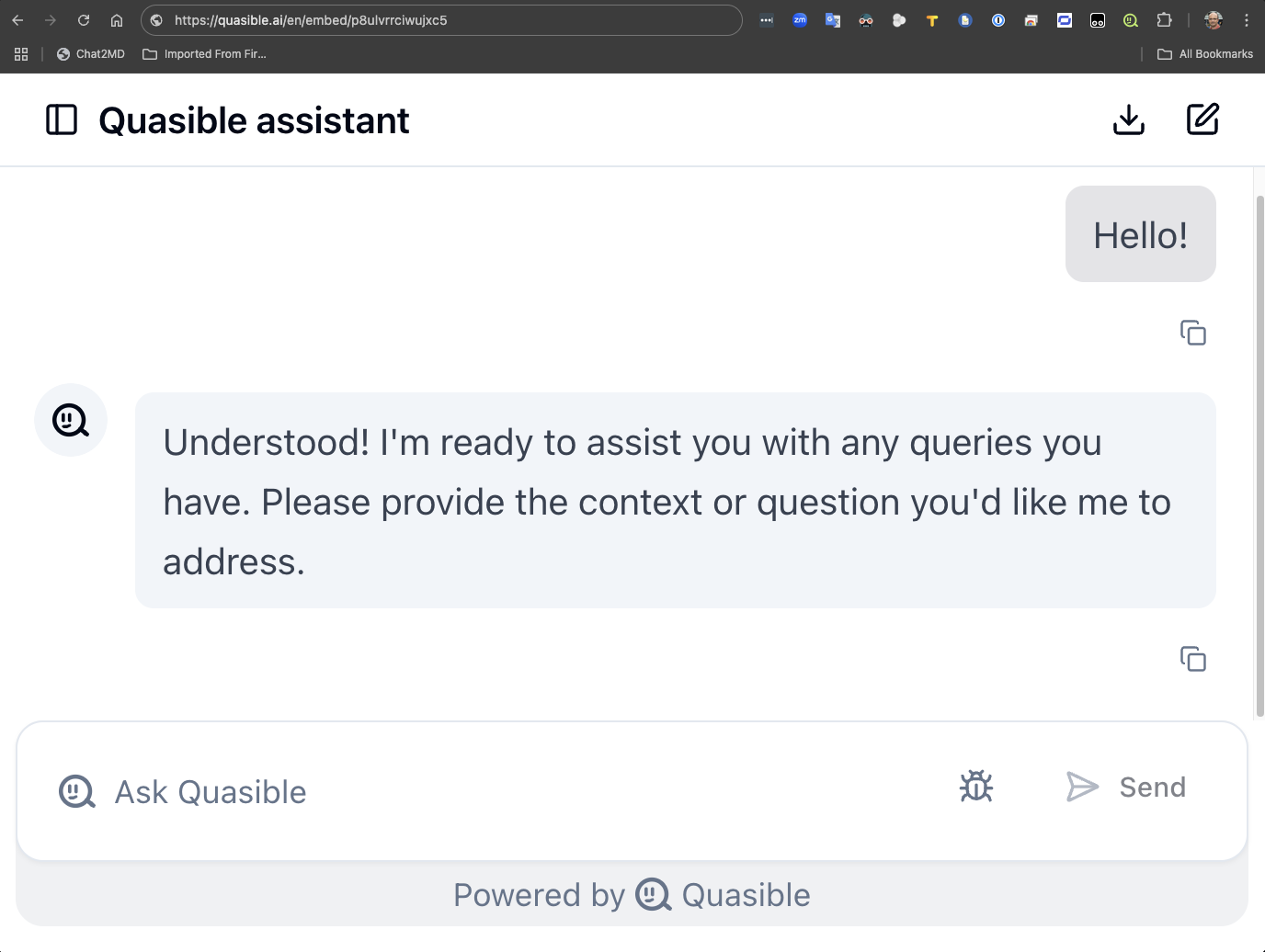
- DONE!
Set the Agent Workflow
Rational
By default Quasible agents use a generalist Generative AI without any specific expertise.
If you have created a workflow, you can set your agent use this workflow for each input received.
Process
- Click on
 in the Agent configuration main
screen
in the Agent configuration main
screen

- Click on the dropdown Workflow item and select a pre-defined
workflow or create a new one:

- DONE!
Quasible Chrome Extension
Rational
You can access all your public agents using our Google Chrome extension.
You can find below the process to install and use the extension and then benefit on any page of your agents.
Process for Getting the Quasible Chrome extension
Get it from us on request at:
Process for Installing the Quasible Chrome extension
- Open Google Chrome
- Select Window / Extensions
- Activate "Developer mode"

- Click on "Load unpacked"

- Select the folder of the extension
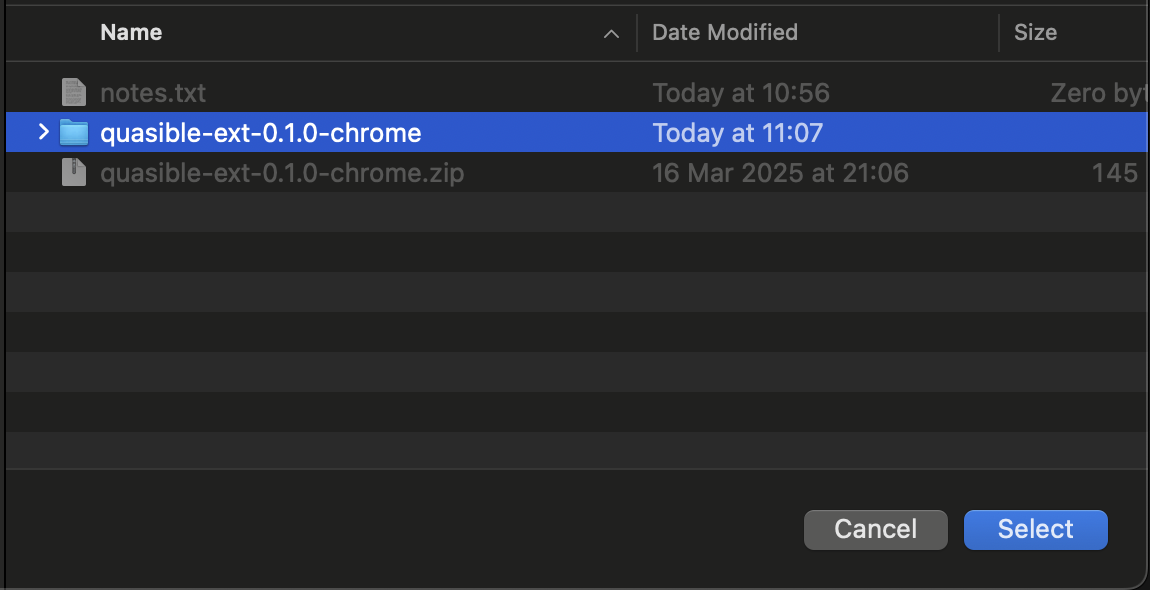
- Check that you have it and that it is activated


- Click on

- Activate all these options:

- If you open any website page you should see:
- the Quasible icon in the toolbar

- The quasible ChatBot on the bottom right


- DONE!
Process for Adding a Public Quasible Agent
- Click on the Quasible extension icon
- Ensure that it is Enabled

- Click on open settings
- Click on "Add new Agent"
- Set the Agent ID and name

- Scroll down in the pane and click "Save Settings"

- Delete the Default Agent

- Close the pane

- Close the Quasible extension tab

- Open a web page and, to get all your agent list updated, force
reload by clicking on
shift +


Using a Public Quasible Agent
-
Click on Quasible Chatbot Icon

-
Select the Agent you want to use using the agent list dropdown

-
Ask your Question

-
If necessary switch the agent
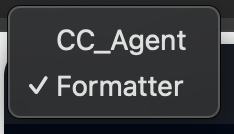
-
Ask your agent specific question

-
Exploit the results
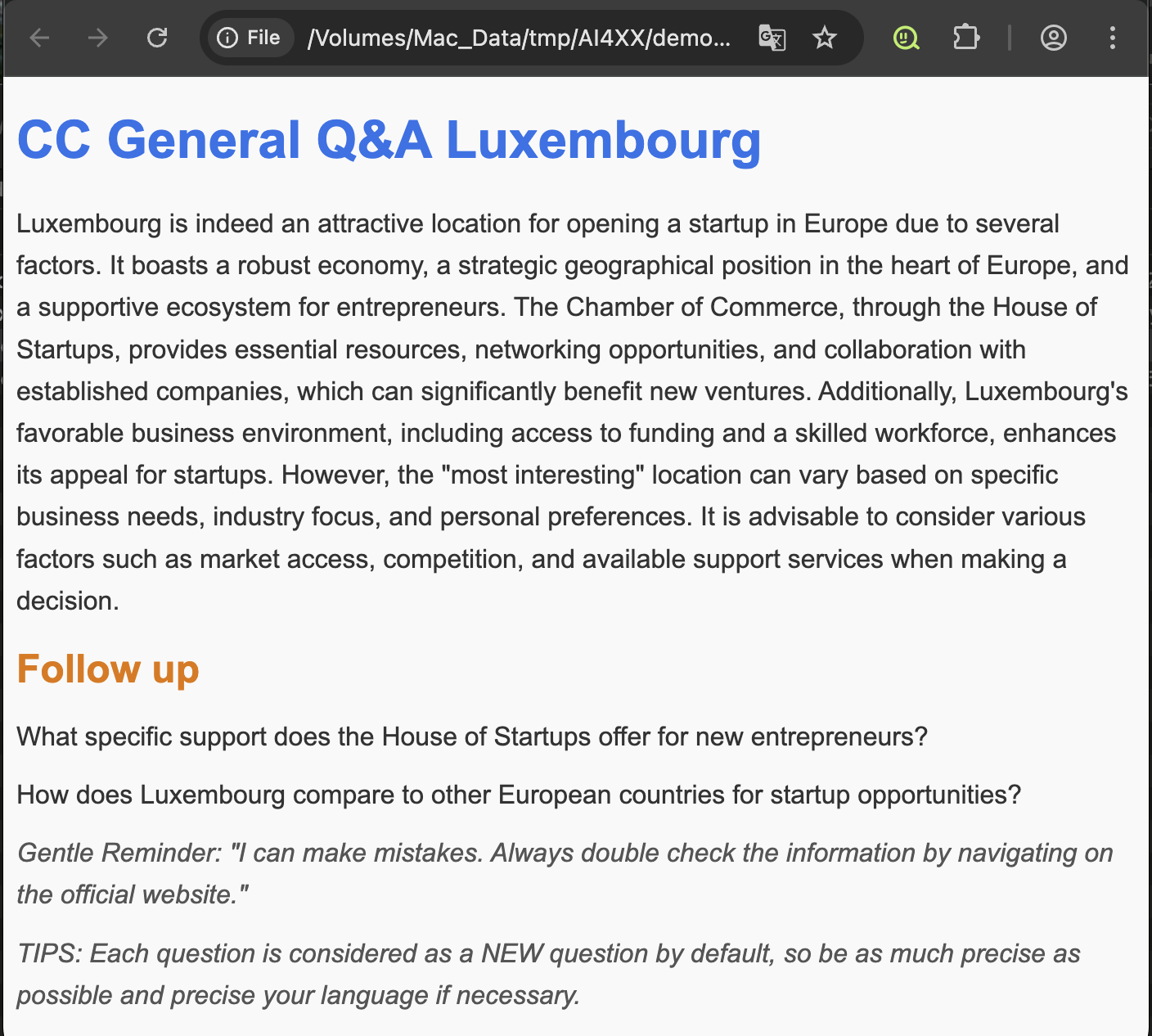
-
DONE!
Making PUBLIC a Quasible Agent
!! CAUTION !!
When you make public a Quasible agent then anyone having the Quasible
extension and your agent ID can access your agent.
This means that
all the consumed tokens
are billed on your account.
- Access your agent in
quasible.ai

- Click on General in the Agent Settings pane
- Switch on the "Public Agent" toggle button

- Record the agent ID located in the URL

In this case the ID would be: ymfkbrtseufntawnt853ihwwj
Glossary
| Term | definition |
Document FAQs
Documents
Can I import multiple documents at once?
Not yet, you have to select documents one by one.
Can I import a folder to import all its content?
Not yet, you have to select documents one by one.
Can I import a zip file?
No, this feature will not be offered since you need to manage carefully the documents in your knowledge base.
